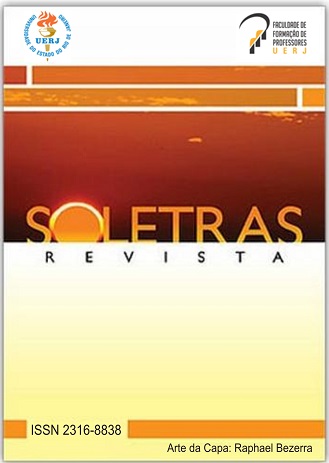Ludismo verbal e metalinguagem em Um barco em meu nome, de Gloria Kirinus
DOI:
https://doi.org/10.12957/soletras.2024.85108Resumo
Na cena contemporânea da literatura de recepção infantil e juvenil, muitas e constantes têm sido as transformações ocorridas nos procedimentos de produção, recepção e circulação de obras. No que diz respeito às configurações estéticas, não são raros os casos em que os escritores, em suas criações, escolhem adotar estratégias discursivas em que se faz presente a autoconsciência textual. Na bibliografia da escritora Gloria Kirinus há diversos exemplares que recorrem a esse expediente, especialmente por meio da autorreflexividade, do ludismo verbal e da metalinguagem, como acontece em Um barco em meu nome. É diante disso que propomos uma leitura do referido livro da autora, evidenciando como nele comparecem os procedimentos metalinguístico-literários e de que maneira a eles se associa um componente humano que liga a utilização de certos artifícios escriturísticos a formas de representação e autodescoberta da infância. Nossas reflexões estão baseadas em autores como Chalhub (1986), Coelho (2000), Félix e Franca (2018), Kirinus (2004, 2010, 2021), Koryrowski (2008), Lajolo e Zilberman (2007), Pignatari (2011), Souza (2016) e outros.
Downloads
Publicado
Edição
Seção
Licença
A aprovação dos artigos implica a cessão imediata e sem ônus dos direitos de publicação nesta revista. O(s) autor(es) autoriza(m) ao Programa de Pós-graduação em Letras e Linguística (PPLIN) a reproduzi-lo e publicá-lo na revista SOLETRAS, entendendo-se os termos “reprodução” e “publicação” conforme definição do artigo 5° da Lei 9610/98. O(s) autor(es) continuará(rão) a ter os direitos autorais para publicações posteriores. O artigo poderá ser acessado pela rede mundial de computadores (http://www.e-publicacoes.uerj.br/index.php/soletras), sendo permitidas, a título gratuito, a consulta e a reprodução de exemplar do artigo para uso próprio de quem o consulta. Casos de plágio ou quaisquer ilegalidades nos textos apresentados são de inteira responsabilidade de seus autores.



